Using OBS to Live Stream Your Service
Guest Post by MediaShout
Because MediaShout church presentation software integrates with a wide range of media files and hardware, we often are asked about streaming and live streaming options by our customers. And while our church presentation software can certainly play a major role in a live streaming system, there are several technologies involved in streaming which we do not have expertise in, and which are required when an organization is considering streaming live events. With the rapid growth of interest in live streaming church services and other events which has been propelled by the response to Coronavirus (COVID-19), we have prepared this article to help explain some of the ways which you may be able to use MediaShout with a popular streaming tool called OBS, and we also recommend a partner of ours — BoxCast — who offer a simple and popular streaming service which can be a very quick and easy way to get into streaming without a lot of technical know-how up front.
There are many ways to accomplish the task of streaming a live event, and some of them may require additional hardware or expertise. Some systems involve a video switcher feeding a separate streaming computer or stand-alone hardware device, and others can be accomplished using only a single computer and software. There are trade-offs between functionality, quality, and which streaming services can be used (YouTube Live, Facebook, etc), so you will need to evaluate which methods best serve your needs. For the most professional results, we recommend using a dedicated hardware video mixer to receive a signal from a camera (or multiple cameras) and the signal from a MediaShout computer, then blend them together and feed to a streaming computer or stand-alone streaming hardware through a service like Boxcast. Very good results can be achieved, however, using some low to no cost alternatives like OBS (Open Broadcasting Software) on your MediaShout computer, and that is what we will describe here.
Please Note: Running this combination of software on a computer can cause heavy use of system resources, so be sure that you test it and are comfortable with the performance of your system before going live. With adequate hardware, however, this can be a great solution to get a simple live stream up for your church and have the ability to present lyrics or scriptures overlaid on top of the stream directly to Facebook Live or Youtube. Also, while this setup can work well in many situations, we do not officially endorse OBS or have the expertise to provide support for their software. For any further detail than what is provided in this article, please reach out to the OBS community or online tutorials (not MediaShout Support).
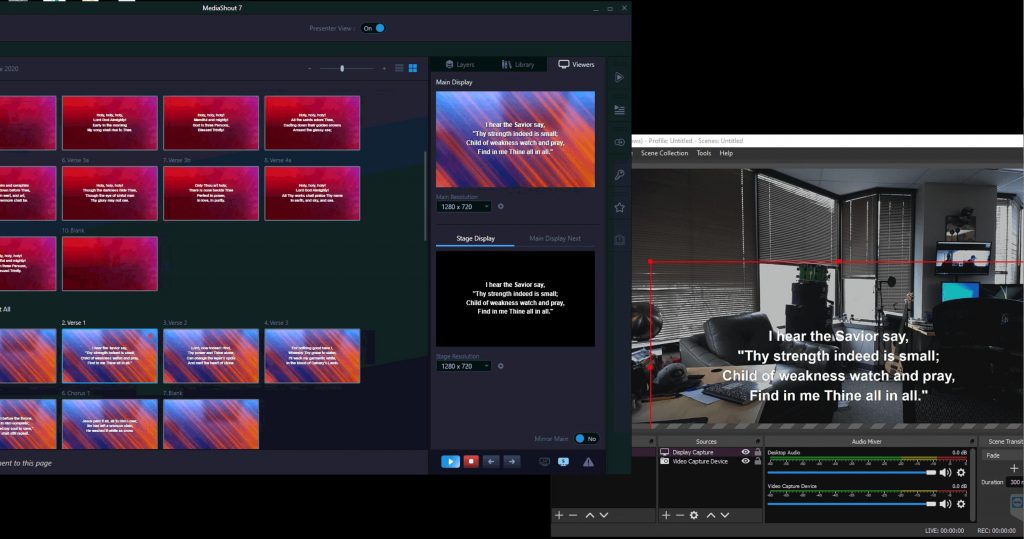
There are two primary scenarios which you could use while incorporating MediaShout with OBS software:
- Scenario 1 will be used if you have a live audience, and you want to keep using the Main display to project content specifically for your on-site congregation.
- Scenario 2 will be a great option if you don't need projection for a live audience, but you still want to use the Stage Display (Confidence Monitor) output from MediaShout for a worship team or presenters who are facilitating the live stream.
How to stream with MediaShout and OBS:
1. Open up MediaShout and get your displays running the way you normally would if you were using a Main Display for the congregation and a Stage Display as a secondary output. While there may be other ways of setting OBS up to receive an input signal, the simplest way we've found is to actually have your external displays connected, so you can piggy-back off one of their outputs. If you were looking at all three screen outputs, it would look something like this (the order of the screens doesn’t matter):
2. Open up OBS. If it's the first time you run it, it should ask you some questions to help you set it up. We recommend going through those steps! It may ask your desired resolution, etc. 1920x1080 is a pretty normal HD resolution that should work in most cases, but you can also get very good results with 1280x720 and it will put much less strain on your PC and your internet connection.
OBS will allow you to connect to a streaming account like Youtube or Facebook Live. You may need to use the HELP or FAQ on OBS if you need help with the details on streaming keys, etc. We do not have the expertise to explain that, but OBS makes it very easy to set up. If you need to go back and connect your stream accounts later, you can do so via the Settings of OBS. If you're not sure about the stream key, it looks as if you can even press the "Get Stream Key" button to open your streaming account's website and retrieve this information.

3. After you're done with the settings, you'll get the basic control screen of OBS. At the bottom, hit the + button under Sources to add a video input device. Note that any basic webcam or video input device or feed will automatically appear in the menu. In some situations, you may decide to use a video capture device for your computer. This is an area where you may need to look to an AV professional for assistance if you don't already have this setup or knowledge. (There are too many variables for us to be able to recommend specific hardware or solutions.)
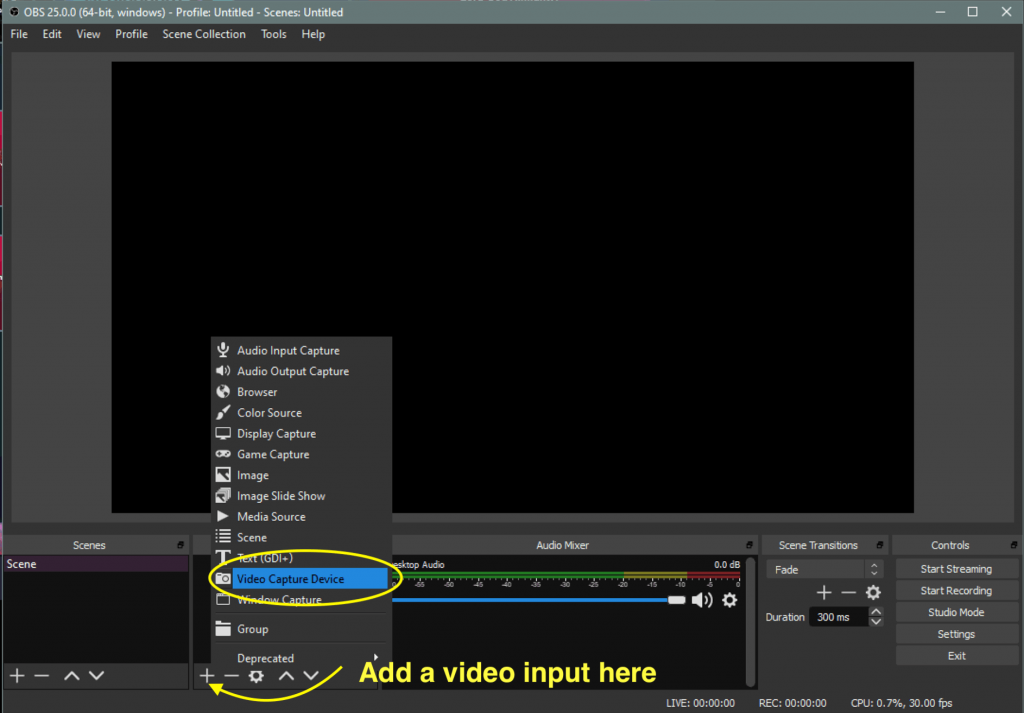
Then press OK on the prompt:
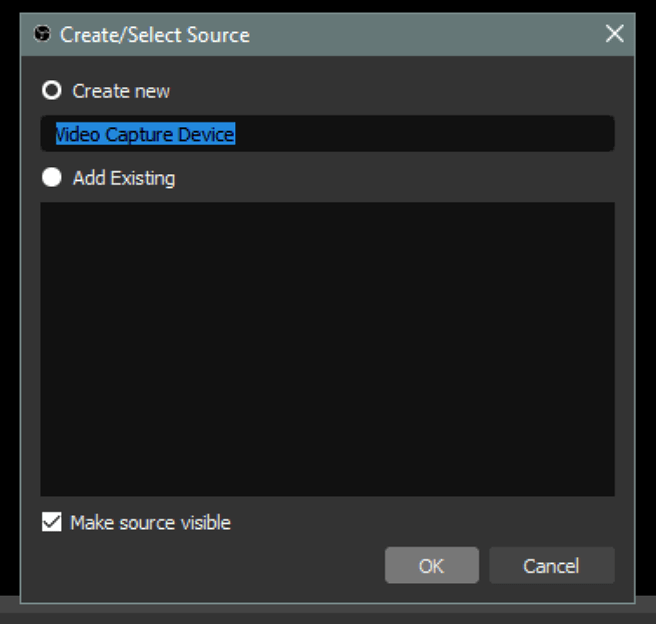
4. On the video setup screen, select your input device, set your resolution if needed, and press OK.
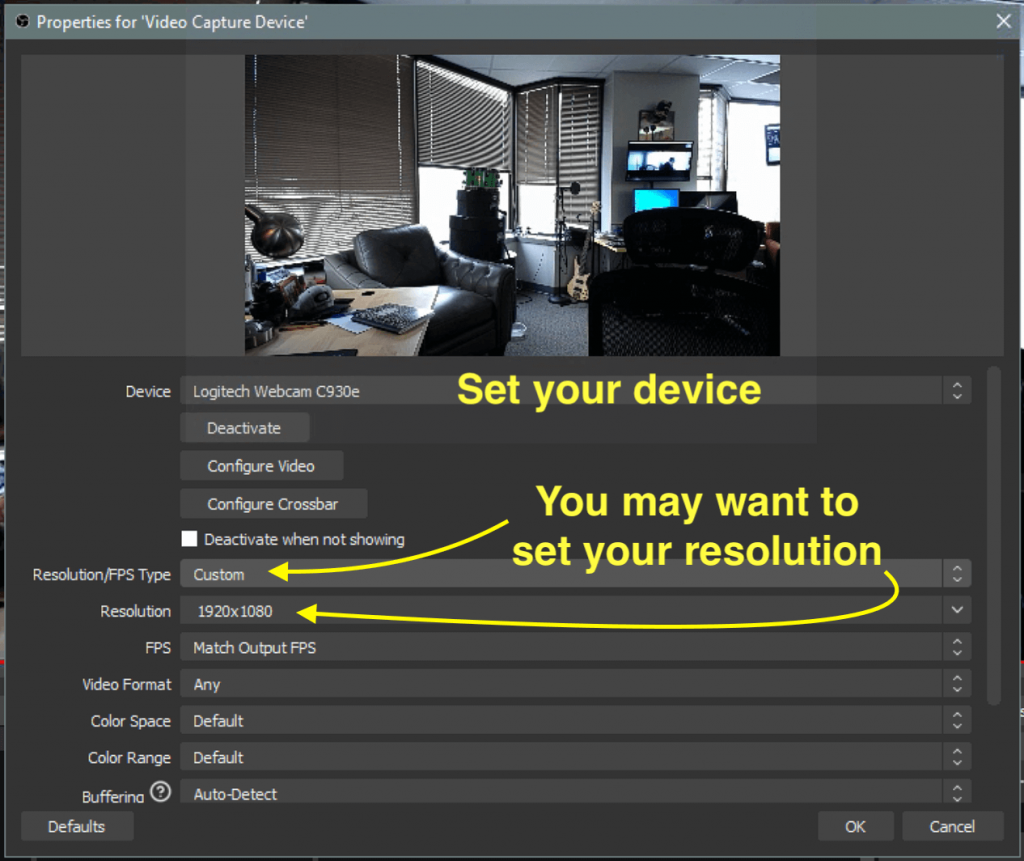
Then your OBS control screen will display your video input, which will look like this:
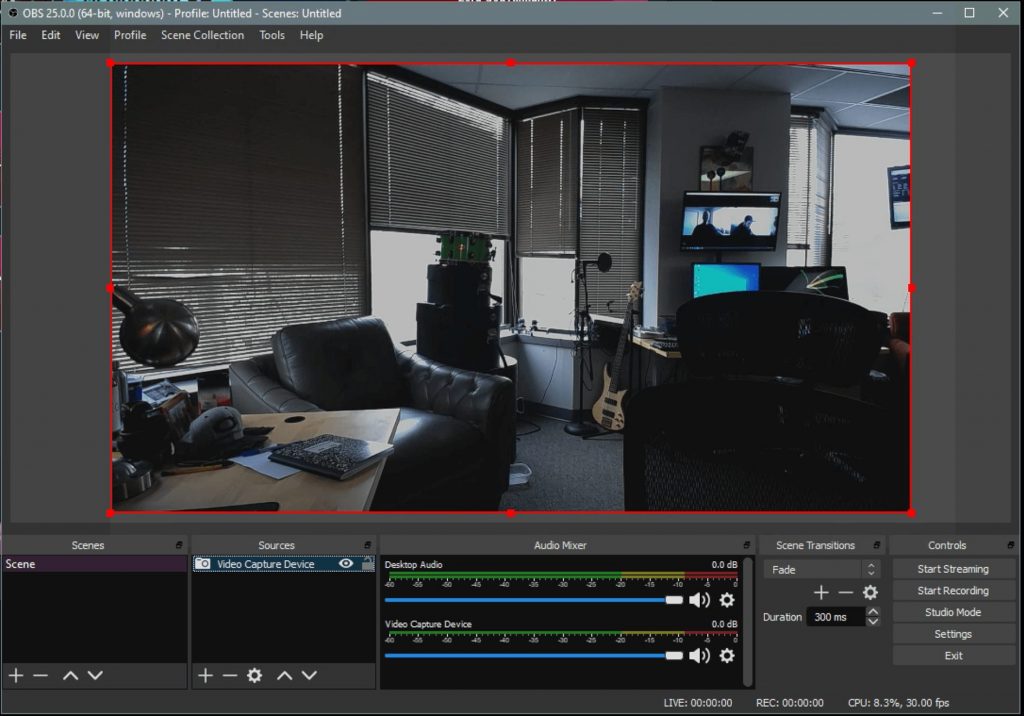
5. Now that your video feed is showing, the next step is to add MediaShout as another layer. Press the + button at the bottom in the Sources box again, and this time select Display Capture.
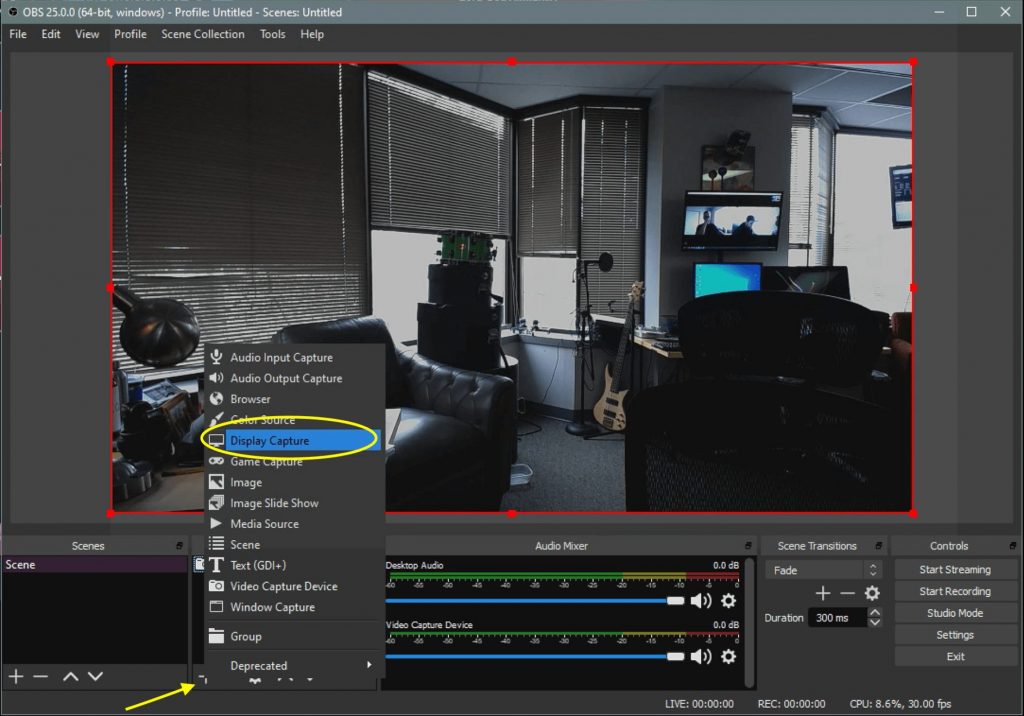
Then press OK on the prompt:
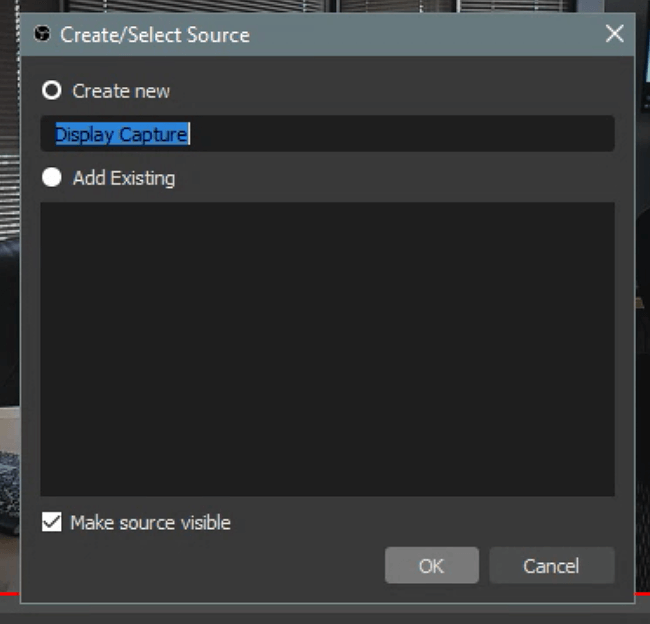
6. OBS will bring up a window for you to choose which Display output to use. Which display you select will be determined by the scenario (1 or 2 above) that you want to configure for.
- Scenario 1: You will want to select the same monitor as MediaShout's Stage Display output. This will allow you to continue using the Main display as normal.
- Scenario 2: You will select the monitor of MediaShout’s Main display output. This will be your best option if you would like to continue using the Stage display for separately formatted or customized, information display for the team on stage.
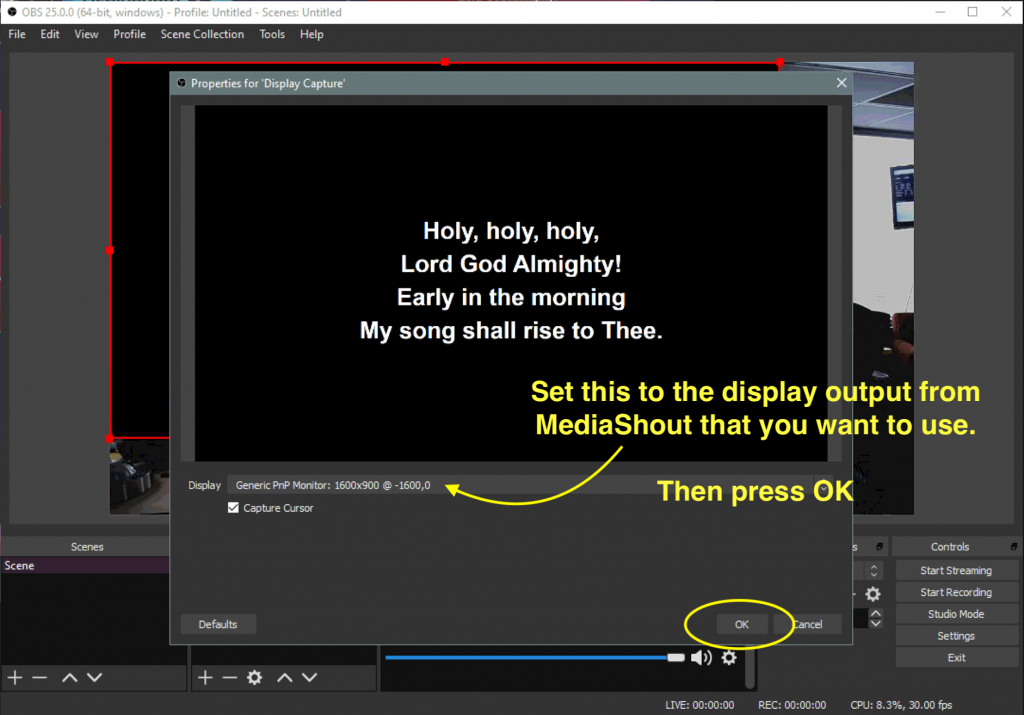
7. Now you will see that you are getting closer. Take a moment to drag the MediaShout image to the general area where you'll want to display the words. (Don't worry, we'll get rid of the black box momentarily.)
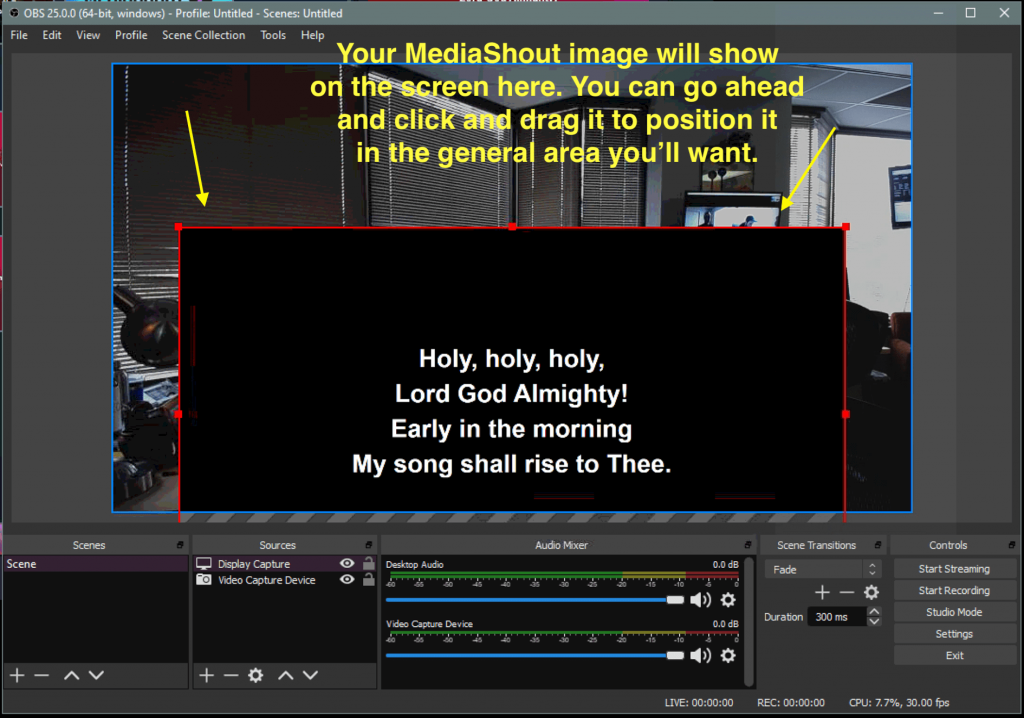
8. Now that your image is in place, right-click on it, and select "Filters" from the menu.
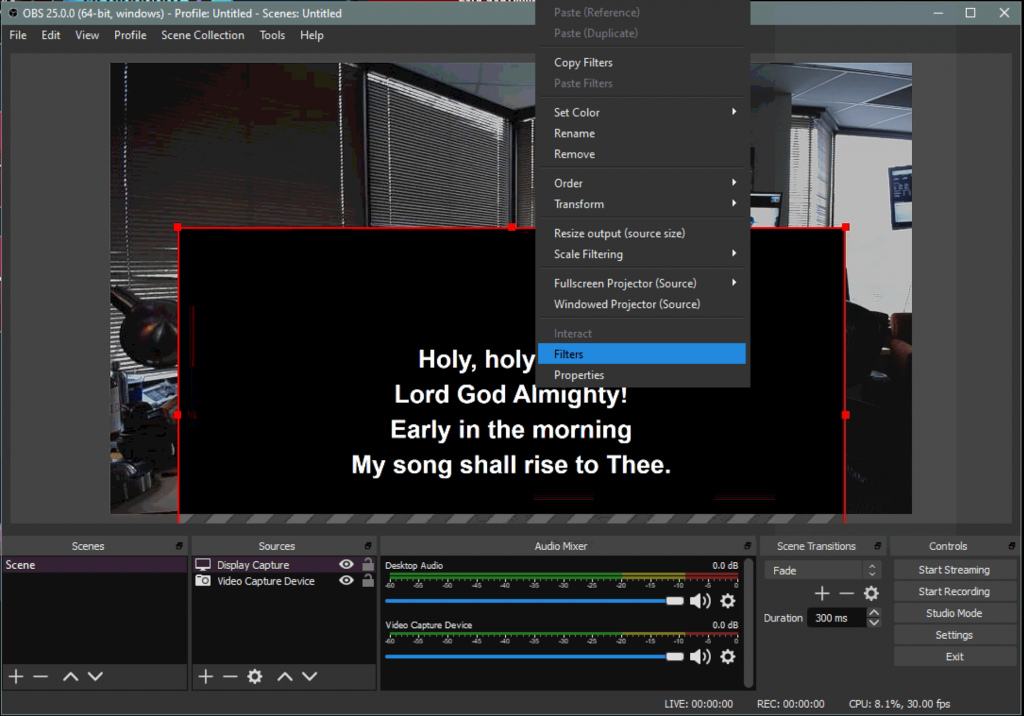
9. On the Filters screen, click the + button on the bottom left, and choose "Color Key" from the menu.
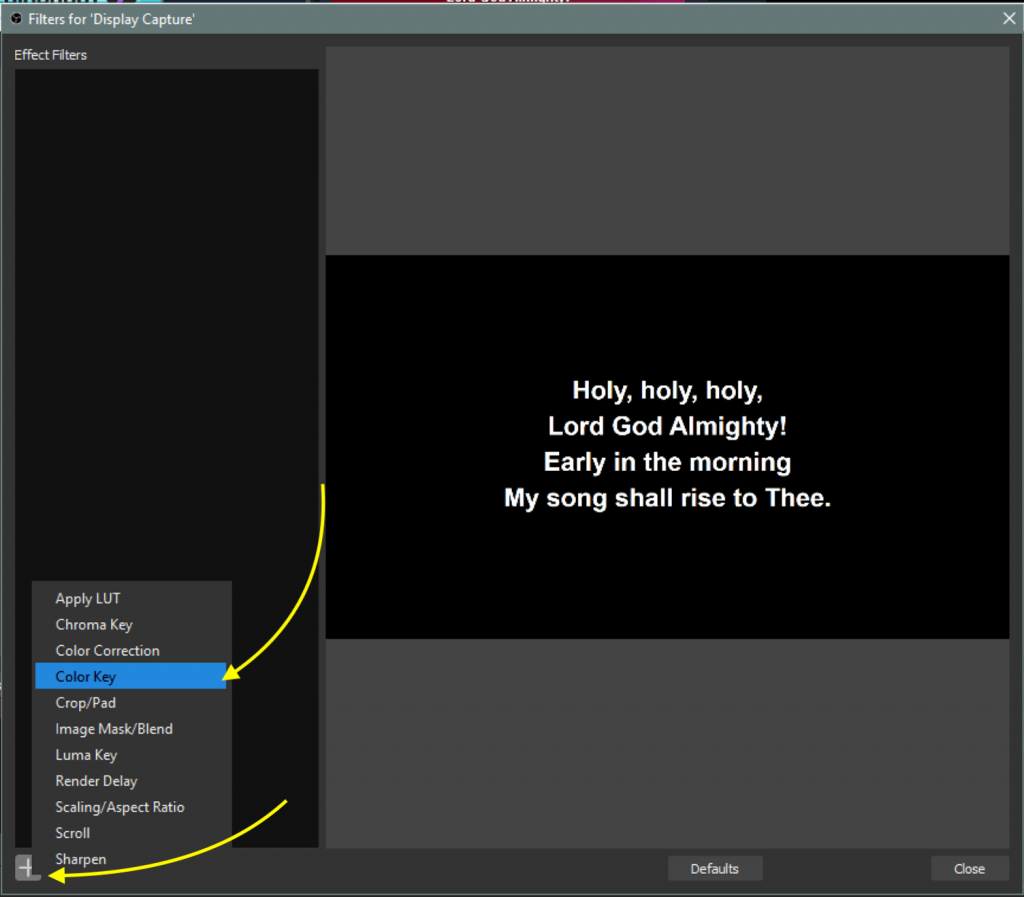
Select to use a Custom color, then press to set that color.
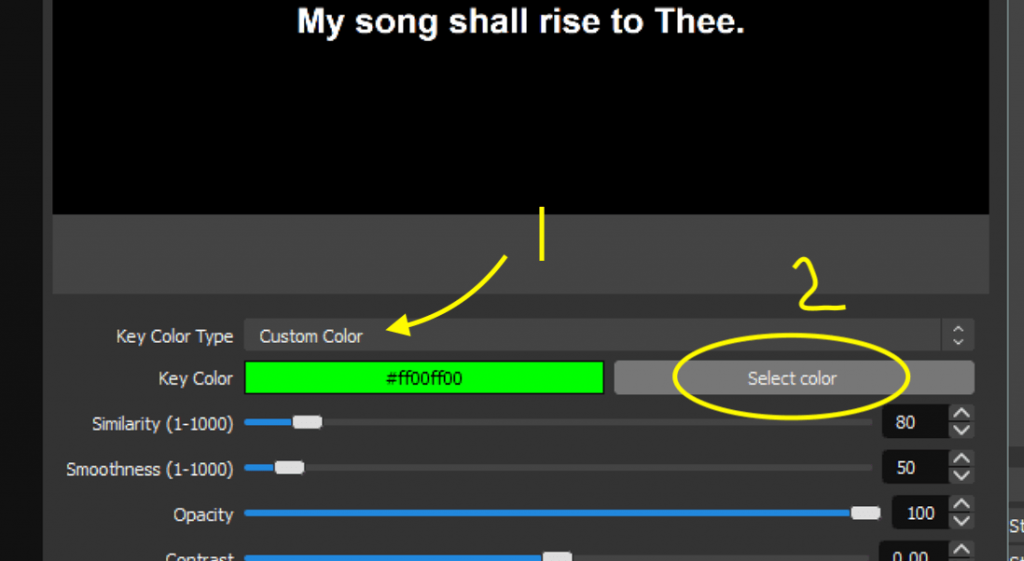
In this case, we will choose black and press OK. (You are able to use a green or another color if needed, as long as it matches the background in MediaShout.)
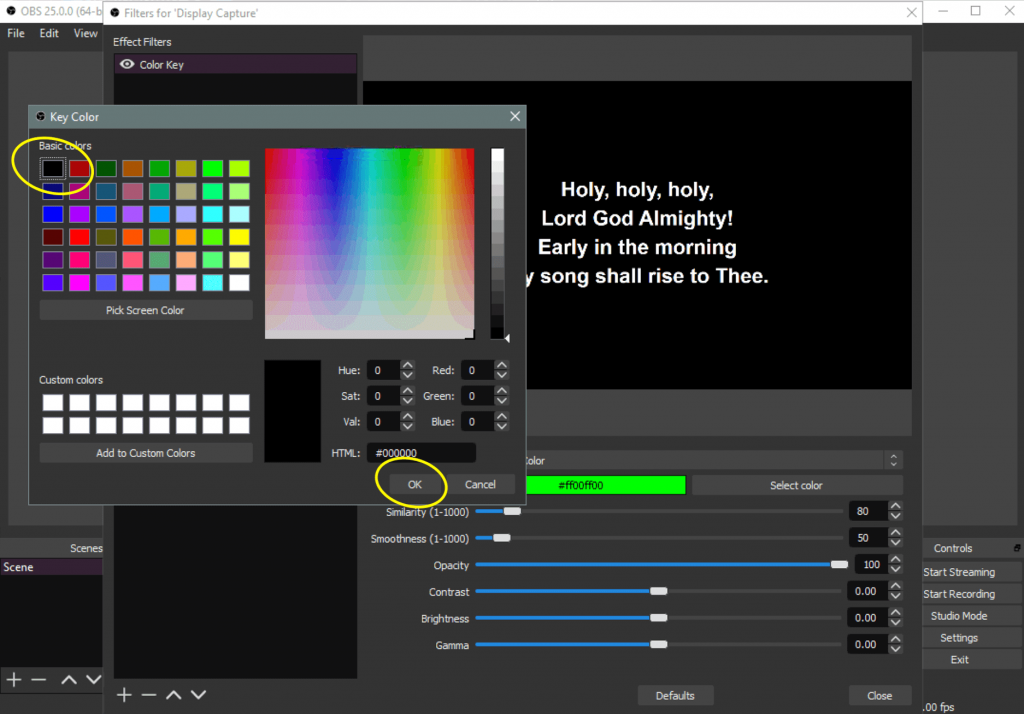
Once you're done, it will look like this and you'll press Close at the bottom right:
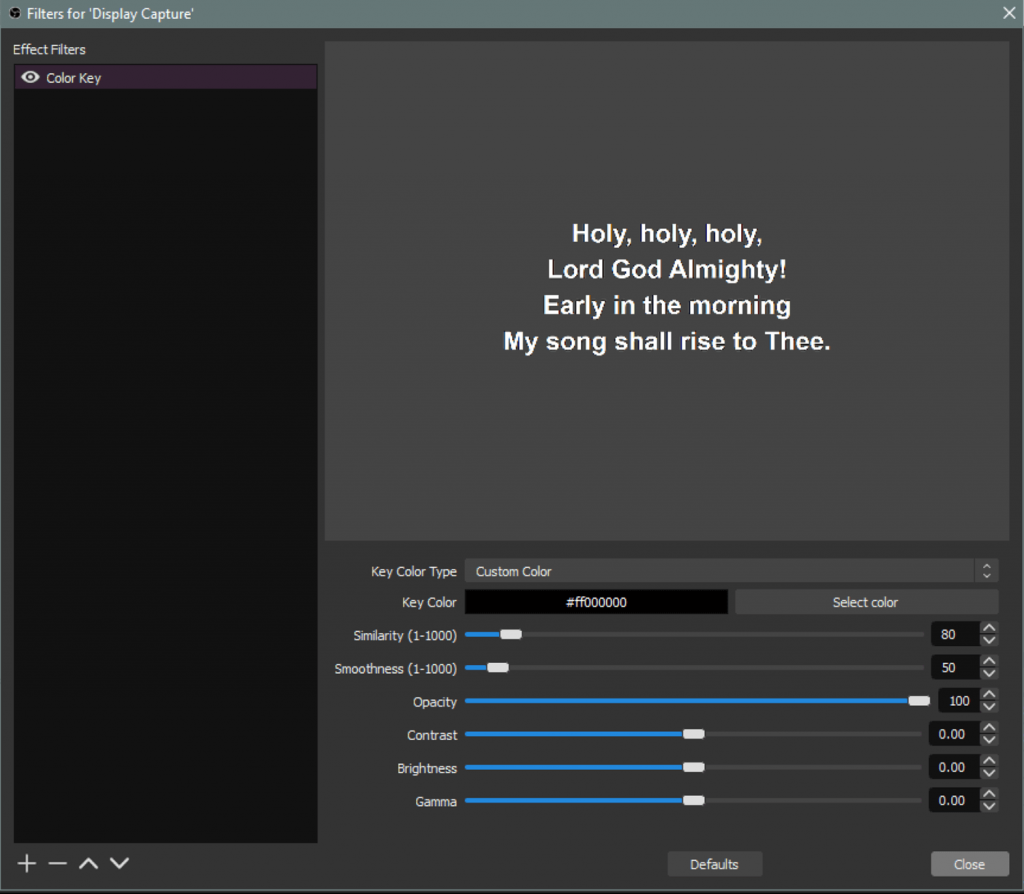
You will now have the words from MediaShout configured to overlay your video feed in OBS, and it will look like this:
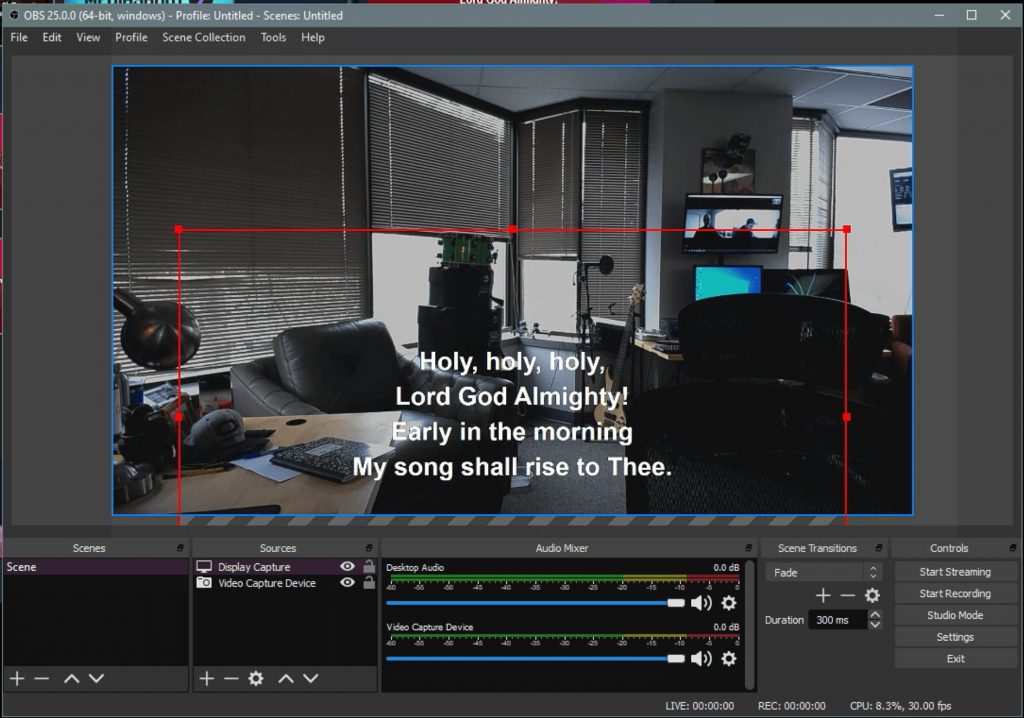
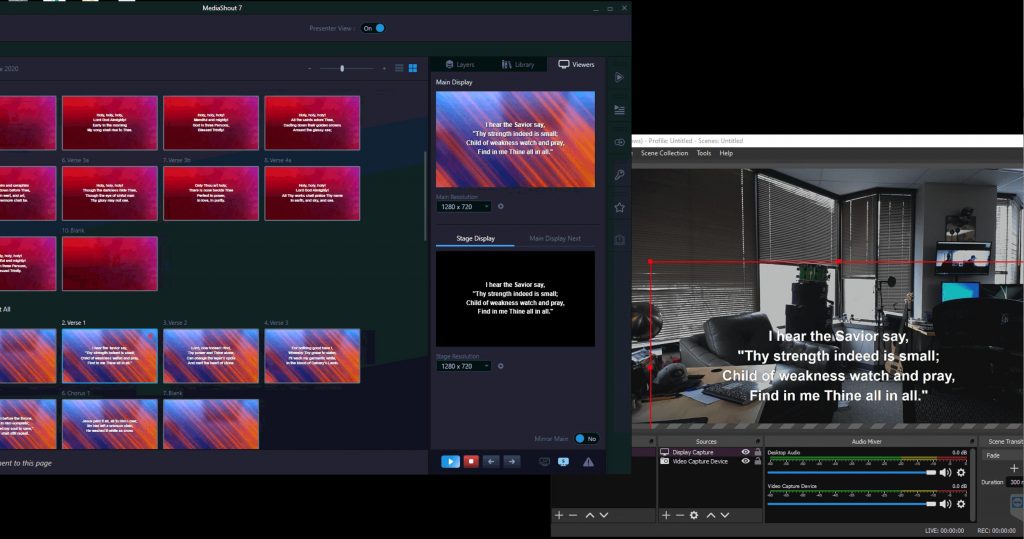
Now, you'll just need to put your songs and other content into the MediaShout script and you'll be good to go! We recommend WorshipHouseMedia.com for tons of videos and graphics and twelve:thirty media for custom church graphics.
(On MediaShout 7, if you are using the Stage display output, remember to press the Sync to Stage button to transfer the words from the Main display onto the Stage display. If you're using the Stage output from MediaShout 6, you may want to click Edit Stage and then delete (or hide) any extra content you don't want, such as the token items for the ‘Next Line’ at the bottom or ‘Stanza Name’ at the top.)
10. Another important step will be setting up OBS to receive the audio for your live stream. You'll need to work out some details like getting a feed from your church's soundboard and running it into the streaming computer via an audio input jack (mic or line input). Usually, this can be done with a simple cable or you can use an external USB audio interface for the best quality signals.
Then use the + button in the Sources to add it and select your audio source. Keep in mind there are many advanced options in OBS if you should need to delay the audio signal to sync with the video, etc.
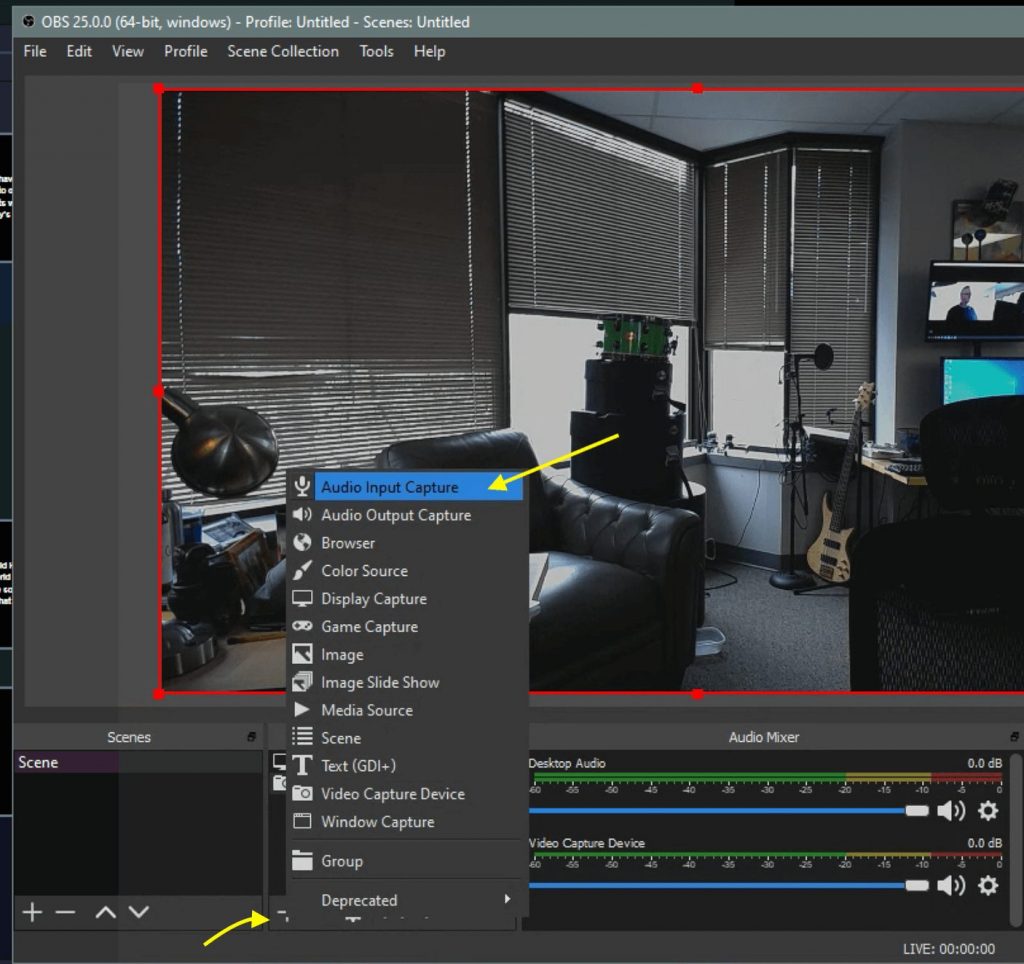
Finally, you'll need to press "Start Stream" after you've set up all your stream details and you should be ready to go live!
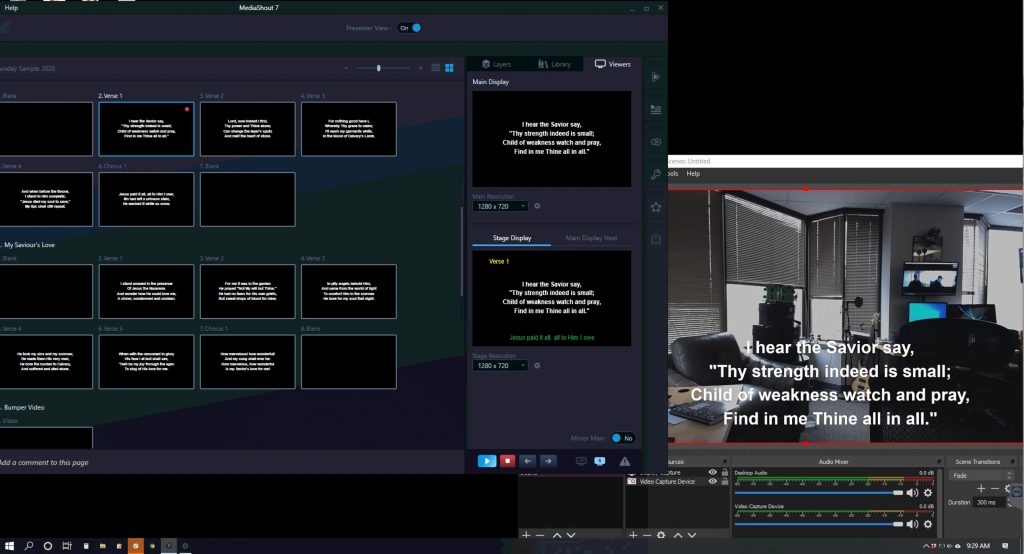
We hope this article helps in situations where you need to configure a simple low to no cost live stream solution using your computer. This solution will require some computer knowledge and the ability to dig into tutorials and settings, and this may take a little while to set up and get used to. If you need a very simple and modestly priced solution which requires very little time or effort to setup and configure, and which includes the streaming hardware, automatic management of your live streams, recording and hosting your streams, and ability to embed them directly on your website, check out our streaming partner: Boxcast. They offer a solution which is virtually plug-and-play, and they specialize in ministry streaming services! We also hope that you find MediaShout to be the best church presentation software on the market to help your ministry. God bless.
